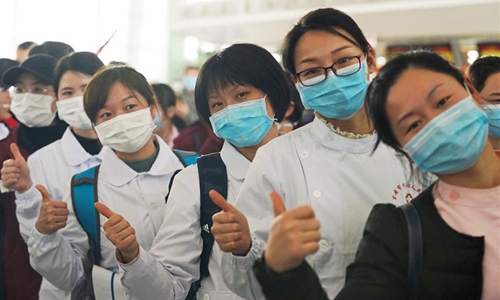
Medical care team members queue to board a plane setting off for central China's Hubei Province, in Nanchang, east China's Jiangxi Province, Feb. 4, 2020. A medical care team comprised of 101 members set off for Hubei from Nanchang to combat the novel coronavirus pneumonia on Tuesday. (Xinhua/Wan Xiang)
The novel coronavirus pneumonia outbreak has caused tremendous concern. This is understandable, and necessary preventive and control measures ought to be taken. At the same time, there is no need to panic or resort to excessive measures. Instead, confidence can serve as the most lasting vaccine against fear.
Confidence is based on solid efforts. The campaign against the virus launched by the Chinese government is unprecedented in both scope and intensity. The entire nation has been mobilized. President Xi Jinping has convened top-level meetings to plan unified nationwide efforts. Premier Li Keqiang has visited the epicenter. A 1,000-bed special hospital, built in 10 days, is already admitting patients and another one with 1,500 beds will be ready in a couple of days. Other cities are sending medical professionals and supplies to support Wuhan. Scientists are racing against time to identify and contain the virus. China has lost no time in sharing data including the genetic sequence with the World Health Organization (WHO) and other countries and regions. Travel within the country has been reduced to the minimum to stop the spread even though it is still the holiday season. People are staying at home while praying for those fighting the battle at the front line.
Confidence is based on professional judgment. As the most authoritative international organization in combating epidemics, the WHO and its director-general have spoken highly of the Chinese response. Many measures taken by China are well beyond the requirements of international health regulations. Thanks to the thorough and strict approach China has adopted not just for the sake of its own citizens but also the international community, according to Director-General Tedros Adhanom Ghebreyesus, "the spread to other countries is minimal and slow. The number of cases (outside China) ... is actually small and it's coming only slowly. So it can be managed." This is what gives the WHO confidence in advising against restrictions on international travel and trade.
Confidence is based on international solidarity. Viruses know no national boundaries and this outbreak, like the previous ones, poses a threat to us all. Hence the importance of concerted international efforts. Czech President Milos Zeman has written to his Chinese counterpart to express sympathy and support; so have other world leaders and people from all walks of life. International assistance in kind is also coming in to ease the shortage of face masks, protective suits and other medical supplies in Chinese hospitals while China itself increases production to its full capacity. The WHO is also mobilizing capacity and resources to help countries that might be impacted and that have weaker health systems. This spirit of solidarity is a must if we are to prevail over this or any future global challenge.
The fight against the outbreak is still going on. At this critical juncture, let us not weaken our efforts because of fear, but strengthen our resolve through confidence.
That confidence will only grow as day by day we see the outcomes of solid efforts, professional judgment and international solidarity.
The author is Chinese Ambassador to the Czech Republic. opinion@globaltimes.com.cn
